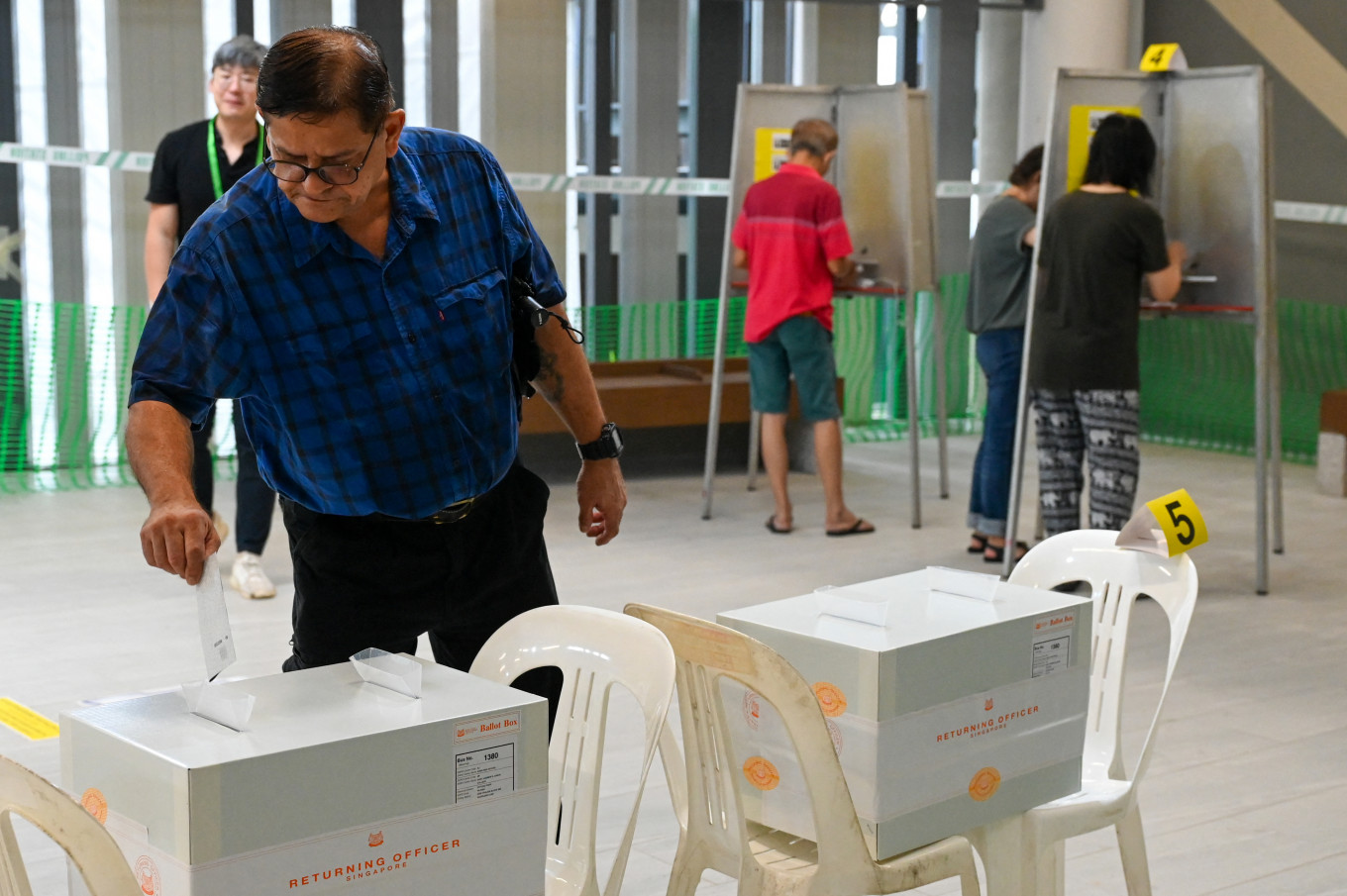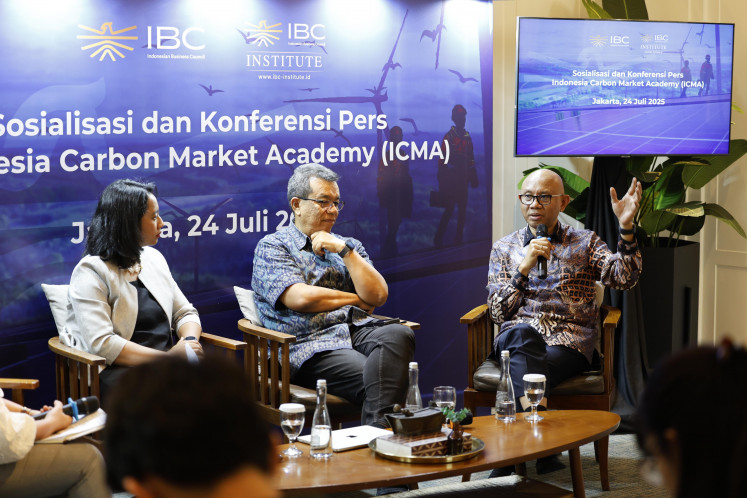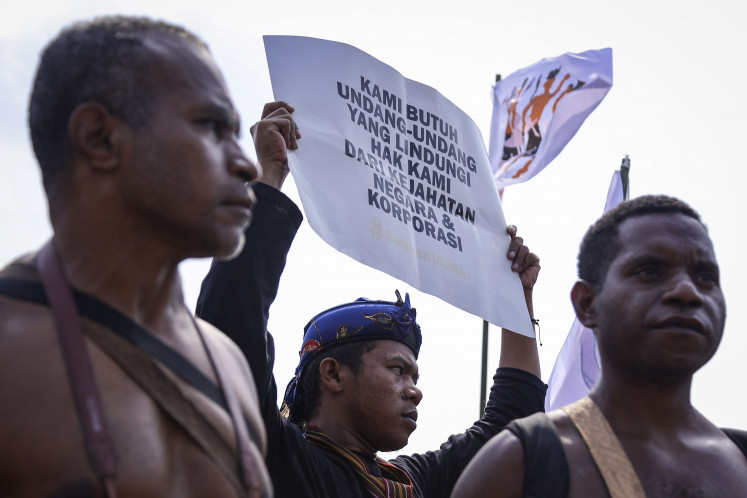Popular Reads
Top Results
Can't find what you're looking for?
View all search resultsPopular Reads
Top Results
Can't find what you're looking for?
View all search resultsWhat we can expect from Singapore as the PAP tightens grip
The three opposition parties could forge a sort of entente, a united strategy to challenge the mainstream narrative being shaped by PAP.
Change text size
Gift Premium Articles
to Anyone
 A voter casts his ballot in the general election at a polling station in Singapore on May 3, 2025. Polling stations opened on May 3 across Singapore as voters began casting their ballots in an election seen as the first real test for Prime Minister Lawrence Wong and his long-ruling People's Action Party. (AFP/Roslan Rahman)
A voter casts his ballot in the general election at a polling station in Singapore on May 3, 2025. Polling stations opened on May 3 across Singapore as voters began casting their ballots in an election seen as the first real test for Prime Minister Lawrence Wong and his long-ruling People's Action Party. (AFP/Roslan Rahman)
S
ingapore’s ruling party, the People’s Action Party, won in a landslide in the election on Saturday, sweeping 87 of the 97 parliamentary seats at stake. The PAP, except in the very initial years of Singapore’s modern history, has always monopolized politics, so its victory is not shocking.
With Prime Minister Lawrence Wong at the party’s helm, the PAP’s control over power is even getting stronger, winning over 65 percent of the total vote.
I followed the campaign with interest, trying to understand if the opposition parties could have a chance at eroding the PAP’s power. I noticed that the social media ecosystem had become more diversified and open to engage with and hear the voice of the opposition.
It was surprising that the citizens of the city state count on a good number of podcasters who do not shy away from talking politics.
Rishi Budhrani is one of them. He is a stand-up comedian who knows how to ask politicians smart questions. Then there is Terence Chia and Haresh Tilani with their satirical Yah Lah But, just to mention a few of these podcasts.
It is a media landscape that is changing and opening up. This is something extremely encouraging and a positive signal for democracy in Singapore.
Just a few years ago, thinking about it, such diversity and with it, such curiosity and interest to explore and hear different views was something unimaginable.
Based on this emerging vivacity in what could be defined as an “alternative” media sector, I thought the PAP’s grip on power could get weaker. My forecast was also supported by the fact that the Workers’ Party (WP), the Progress Singapore Party (PSP) and the Singapore Democratic Party (SDP) had put up an intense fight with strong candidates running for office.
At the end of the day, I was wrong. Many, like me, had expected a stronger showing on the part of the opposition.
Only the WP showed resilience and maintained the seats it was defending, even though, overall, there was an expectation that the major opposition party could have fared better.
A silver lining for the WP is that it won all 10 seats that the PAP failed to secure. The WP has now emerged as the main challenger to the PAP's stranglehold on power.
On the other hand, it was a very disappointing night for the SDP despite the valiant fight put up by its secretary-general, Chee Soon Juan, and chairman, Paul Tambyah.
Chee was very close to victory, but it was not enough. His loss is symptomatic of the problems that Singapore’s democracy suffers, because someone with in-depth knowledge of policy issues, determination and charisma like Chee should be sitting in parliament.
Singapore would be in a better place, no matter the narrative created by the PAP about being the safest bet to steer the nation through these turbulent times, if someone like Chee had been elected.
The truth is that elections in Singapore have never been a level playing field, far from it.
There are several factors, starting from the last-minute gerrymandering that severely constrained the capacities of already thin opposition parties.
The fact that candidates must put up a big deposit, around US$10,300 to run, is also outrageous, as this is money that is very likely to be lost considering the grip on power by the PAP. Only candidates who exceed 12.5 percent get their deposit back.
How can an election be called truly democratic when there is such a barrier? What about the fact that Singapore can probably boost the record of holding the shortest-ever election campaign with this year’s only lasting nine days?
Then there is the problem that there are too many political parties in opposition, some of which are not truly political entities and offer, as Terry Xu said, only “meaningless choices”.
In one way or another, the three major parties in the opposition must forge a common front and cooperate even if there are some ideological differences among themselves. The WP, PSP and SDP could forge a sort of entente, a united strategy to challenge the mainstream narrative being shaped by the PAP.
I was hopeful that PM Wong, still fresh in his job, would bring some new vision to national politics, rather than the “usual” competence of the PAP. I thought that he would find some room to open and loosen up the political space.
He resorted to the usual scaremongering tactics, hitting the usual talking points about the indispensability of the PAP. He knew that the opposition had no chance at all, but still he pushed hard on the risks of allowing a few more members of the opposition to enter parliament.
Singapore indeed faces many challenges ahead and, unquestionably, the PAP is a competent party, even though far too self-righteous and arrogant.
Still, PM Wong could usher in a new phase of politics by taking some bold steps and allowing a more level playing field over the next few years.
To start with, he should genuinely engage the major opposition parties, even those left, once again, out of parliament. Respectfully listening to the leaders of the three or four major political parties in the opposition even through informal closed-door discussions, can show that the PAP values different views.
Pritam Singh, the leader of the WP, proved, once again, his capacities and tenacity over the whole campaign. He surely deserves respect and likewise, many of his team members who, no matter how competent they were, lost.
Hopefully, the alternative media landscape will continue to grow and play a role in questioning the PAP’s policies whenever necessary by also giving the benefit of doubt to counter views.
But there is one more thing that PM Wong and the PAP could do.
They could turn their interest in engaging the public through consultative mechanisms (so far highly controlled) into real opportunities for people to deliberate and come up with their own options and recommendations.
Through strong exercises in deliberative democracy, the PAP can show respect to ideas that come from the bottom and address them adequately, even if they are not part of its traditional playbook.
***
The author is a freelancer who writes about regional politics, human rights and development in the Asia-Pacific.










